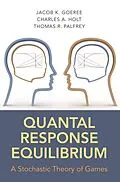Quantal Response Equilibrium presents a stochastic theory of games that unites probabilistic choice models developed in psychology and statistics with the Nash equilibrium approach of classical game theory. Nash equilibrium assumes precise and perfect decision making in games, but human behavior is inherently stochastic and people realize that the behavior of others is not perfectly predictable. In contrast, QRE models choice behavior as probabilistic and extends classical game theory into a more realistic and useful framework with broad applications for economics, political science, management, and other social sciences.
Quantal Response Equilibrium spans the range from basic theoretical foundations to examples of how the principles yield useful predictions and insights in strategic settings, including voting, bargaining, auctions, public goods provision, and more. The approach provides a natural framework for estimating the effects of behavioral factors like altruism, reciprocity, risk aversion, judgment fallacies, and impatience. New theoretical results push the frontiers of models that include heterogeneity, learning, and well-specified behavioral modifications of rational choice and rational expectations. The empirical relevance of the theory is enhanced by discussion of data from controlled laboratory experiments, along with a detailed users' guide for estimation techniques.
Quantal Response Equilibrium makes pioneering game-theoretic methods and interdisciplinary applications available to a wide audience.
Autorentext
Jacob K. Goeree is a Distinguished Research Professor and head of the Economics Discipline Group at the University of Technology Sydney. Charles A. Holt is the A. Willis Robertson Professor of Political Economy at the University of Virginia. Thomas R. Palfrey is the Flintridge Foundation Professor of Economics and Political Science at the California Institute of Technology.
Zusammenfassung
Quantal Response Equilibrium presents a stochastic theory of games that unites probabilistic choice models developed in psychology and statistics with the Nash equilibrium approach of classical game theory. Nash equilibrium assumes precise and perfect decision making in games, but human behavior is inherently stochastic and people realize that the behavior of others is not perfectly predictable. In contrast, QRE models choice behavior as probabilistic and extends classical game theory into a more realistic and useful framework with broad applications for economics, political science, management, and other social sciences.Quantal Response Equilibrium spans the range from basic theoretical foundations to examples of how the principles yield useful predictions and insights in strategic settings, including voting, bargaining, auctions, public goods provision, and more. The approach provides a natural framework for estimating the effects of behavioral factors like altruism, reciprocity, risk aversion, judgment fallacies, and impatience. New theoretical results push the frontiers of models that include heterogeneity, learning, and well-specified behavioral modifications of rational choice and rational expectations. The empirical relevance of the theory is enhanced by discussion of data from controlled laboratory experiments, along with a detailed users' guide for estimation techniques.Quantal Response Equilibrium makes pioneering game-theoretic methods and interdisciplinary applications available to a wide audience.
Inhalt
- Frontmatter,
- Contents,
- Preface,
- 1. Introduction and Background,
- 2. Quantal Response Equilibrium in Normal-Form Games,
- 3. Quantal Response Equilibrium in Extensive-Form Games,
- 4. Heterogeneity,
- 5. Dynamics and Learning,
- 6. QRE as a Structural Model for Estimation,
- 7. Applications to Game Theory,
- 8. Applications to Political Science,
- 9. Applications to Economics,
- 10. Epilogue: Some Thoughts about Future Research,
- References,
- Index,
